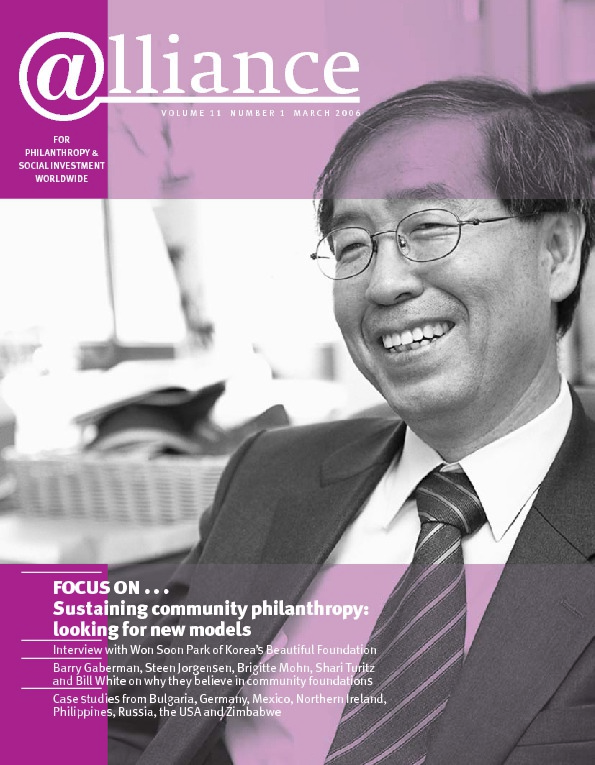The two studies described below are both part of the State of Social Giving in South Africa project, established to analyse resource mobilization for poverty and development in South Africa since 1994. Research teams looked at corporates, the state, poor communities, private foreign foundations and religious communities.
A Nation of Givers?
The results of a recent national survey to measure both attitudes to giving and giving behaviour itself across all communities and areas of South Africa suggest that South Africa is a nation of givers. According to A Nation of Givers: Social giving among South Africans (David Everatt and Geetesh Solanki of Strategy & Tactics), over half of respondents gave money to charities or other causes while a third gave food or goods and just under one-fifth volunteered time in the month prior to being interviewed.
Thinking about the last month, have you personally: % yes
Given money to a charity or other cause? 54
Given goods, food or clothes to a charity or other cause? 31
Given time (ie volunteered) to a charity or other cause? 17
Given money to a beggar/street child/someone asking for help? 45
Given food, goods or time to a beggar/street child/someone asking for help? 45
In addition, slightly less than half of respondents told us they had given money and/or goods directly to the poor – street children, people begging on the street, and so on. These figures include respondents who made monthly financial contributions to a charity as well as those who, for example, gave a sandwich or cold drink to a street child begging at a traffic light. Combining these different forms of giving suggests that 93 per cent of South Africans give time, money or goods.
Nor is giving the domain of the wealthy. The survey found that poor and non-poor respondents were equally likely to have given in the month prior to being interviewed. It is part of everyday life for all South Africans. Men gave slightly more than women.
Charities and organizations received considerably more money than was given directly to the poor. Respondents who gave money to formal structures gave R80,781 in total (an average of R49 each), while the total amount given to poor people was R20,000 (R14 per giver). Interesting racial differences emerged here: while white people gave almost equal amounts to organizations and directly to the poor, all other racial groups tended to give significantly more to organizations.
In all, 77 per cent of respondents told us they gave money either to organizations or to poor people directly – a total of R100,571 (an average of R44). Extrapolating these findings to the population as a whole suggests that South African citizens mobilize almost R930 million in an average month for development and anti-poverty work – an amount which is 2.2 per cent of the total monthly income for the working age population.
Like Chalk, Like Cheese?
The quest for ‘professionalism’ currently dominates South African corporate social investment (CSI). Practitioners and opinion formers decry the traditional tendency for giving priorities and practices to be determined by the ‘whim’ of a company chief executive or chair and insist that CSI must be ‘professionalized’ if it is to serve the needs of both society and donor companies.
But is professional CSI superior to – or substantially different from – its whimsical alternative? In an attempt to test this, Like Chalk, like Cheese? Professionalism and whim in corporate giving at Anglo Gold Ashanti and Pick ’n Pay (Steven Friedman, Judi Hudson and Shaun Mackay) compares two companies which adopt the different approaches. While it finds noticeable differences in the practice and ethos of the two, it argues that the similarities were far more pronounced than the current understanding of ‘professionalism’ suggests.
First, while the ‘professional’ company paid attention to the way in which decisions were taken in an attempt to ensure that they were not arbitrary and could be defended in public – an important requirement of ‘professionalism’ – some decisions also expressed the personal preference of the chief executive. Second, while the ‘professional’ company’s approach impressed researchers and professionals, that of the ‘whimsical’ company, a national supermarket chain, appealed to the average shopper. Since this contributed to its commercial success, the ‘whimsical’ company had obviously effectively aligned CSI with its objectives.
Third and most important, the study found no evidence that the ‘professional’ approach to CSI yielded superior development outcomes than its ‘whimsical’ alternative. The ‘professional’ company won plaudits when it broke new ground by funding political parties in a manner designed to encourage multi-partyism, while the ‘whimsical’ one seemed eccentric when it supported a programme to enable poverty-stricken youth to become magicians. But there is no good developmental reason to suppose that supporting political parties is better than teaching a usable skill to young poor people.
The study therefore concludes that ‘professionalism’ is an inappropriate criterion for CSI. It cannot be shown to yield better outcomes and it may encourage a uniformity in approach which could impair its usefulness, since evidence suggests that the best guarantor of development effectiveness is trial and error. Given this, innovation rather than professionalism should be seen as a more appropriate goal for CSI practitioners and a better criterion for evaluation.
The project, which took three years to complete, was jointly run by the Centre for Civil Society (CCS) at the University of KwaZulu-Natal, the National Development Agency and the Southern African Grantmakers Association. Project leader was Adam Habib.
For more information, contact Adam Habib at AHabib@hsrc.ac.za, David Everatt at david@s-and-t.co.za or Steven Friedman at steven@cps.org.za or visit the CCS website at http://www.ukzn.ac.za/ccs/default.asp?5,57






Comments (0)